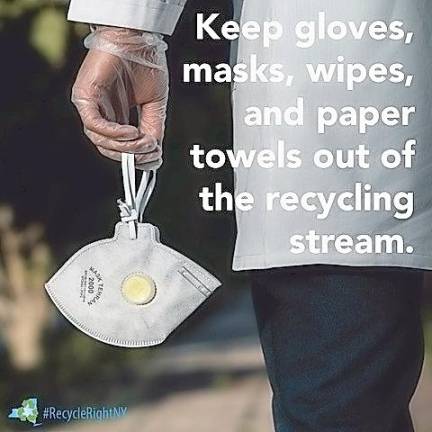Think before using plastics that pollute
The Earth. Yes, the pandemic makes so many things harder - or simply hard, but the environment demands more of us every day.

Dealing with the COVID-19 pandemic presents challenges on many levels, like just having to remain at home for so many hours each day that is stretching into months, socializing with restrictions by maintaining a six-foot distance between yourself and others, and especially having to wear a mask whenever going outside your home for shopping, working and chores.
But while we’re dealing with restrictions associated with COVID-19, let’s not forget the fragile state of our environment.
“It may be hard for people to see the bigger picture right now, but it’s important we stay vigilant in reducing plastic waste because of the lasting effects it has on our environment and human health,” said Goshen resident and environmentalist Christine Cullen Schepps. “We can be mindful of the effect single-use plastics have on the environment while also maintaining our health and safety during COVID-19. It doesn’t have to be one or the other.”
Schepps notes that although single-use plastics — cups, straws, water bottles, utensils - may seem like the more sanitary option, that’s not necessarily the case. According to her, studies show that reusable alternatives such as stainless steel, ceramic or glass can be safely used during the pandemic through basic cleanliness, like hand washing the items in hot sudsy dish detergent or putting them in an automatic dishwasher that uses high-temperature hot water.
Schepps especially encourages using refillable water bottles and not drinking from a plastic water bottle and discarding it after one use.
Aware that the public is wearing masks, gloves and other Personal Protective Equipment (PPE), the Orange County Department of Public Works Division of Environmental Facilities & Services is cautioning everyone not to litter.
“Littering pollutes our waterways and placing these materials, as well as plastic bags, wrappers, and other film plastics in the recycling bin contaminates and adds to the cost of recycling,” said Deputy Commissioner Robert J. Gray in a recent press release.
Plastic bags and wrappers go into trash bins, not recycling bins.
Gray also cites the increase in the amount of paper and cardboard because of online orders being delivered to homes across the county.
“Please,” he said, “be sure to flatten all boxes and place them in your curbside recycling or county transfer station recycling receptacle for mixed paper.”
Back to school advice, regardless of what grade
The Department of Environmental Conversation offers words of advice for students, whether going back to class in elementary school, high school or college.
Along with encouraging students to comply with COVID-19 guidelines to stay healthy, the DEC offers these suggestions for back-to-school to lessen the impact on the environment:
. Reuse notebooks, folders and other school supplies from last year as well as last year’s backpack.
. Use both sides of paper.
. Whenever possible, buy used textbooks or use online versions.
. Pack lunch in reusable containers.
. Say no to plastic utensils, straws and condiment packets, if you don’t need them.
. Take your sustainability club or other club meetings virtual to keep sharing ideas and planning.
If we all follow the suggestions made here — and keep the good of the environment in mind when making choices — we can make a difference to better the future of our own community.
Think before using plastics that pollute and have lasting effects in our landfills and in our waterways.
And remember: never throw plastic products on the ground; use a proper receptacle for all trash.